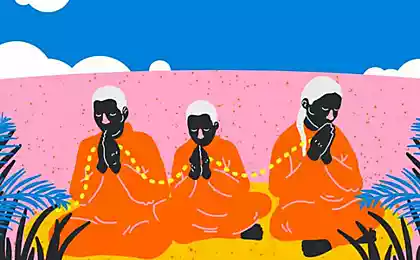399
Each problem has its own technique of meditation
Do not think of meditation only as calming and relaxing means, suggest researchers from the University of Singapore. Each meditation technique is different influences on the physiology of the human body. Besides the relaxation it may also increase the concentration of the consciousness from which you can benefit for our physical health and mental state.

The researchers conducted an experiment in which compared the effects exerted on the body in two types of meditation. From Thailand and Nepal were invited participants practicing the Theravada and Vajrayana. The scientists deliberately chose only experienced adepts to get more reliable results.
Before the experiment, the volunteers underwent ECG and EEG to in the future, scientists could track changes in level of cognitive ability and behavior. Observations showed, during meditation sessions, there are noticeable differences between the body's response to Vajrayana and Theravada.
Theravada relieves stress, promotes deep relaxation, relieves stress. Scientifically speaking, there is a relaxation — increased parasympathetic activation.
Vajrayana is more suitable for emergency occasions when you need to concentrate and make important decisions. Vajrayana causes activation of the sympathetic nervous system, improves cognitive abilities, and this property can be useful for patients with problems related to memory work.
Earlier researchers have tried to systematize the data about the techniques of meditation that would enable to classify them according to the degree and nature of impact on the psyche and physiology. But to complete the study failed because the scientists did not have enough technical capabilities to receive important health indicators and thus confirm the results obtained.
In this study scientists had the necessary diagnostic equipment, the readings of which confirmed the conclusions of experts.
photo: Petter Hegre
источник:heart4life.com.
Source: /users/1077

The researchers conducted an experiment in which compared the effects exerted on the body in two types of meditation. From Thailand and Nepal were invited participants practicing the Theravada and Vajrayana. The scientists deliberately chose only experienced adepts to get more reliable results.
Before the experiment, the volunteers underwent ECG and EEG to in the future, scientists could track changes in level of cognitive ability and behavior. Observations showed, during meditation sessions, there are noticeable differences between the body's response to Vajrayana and Theravada.
Theravada relieves stress, promotes deep relaxation, relieves stress. Scientifically speaking, there is a relaxation — increased parasympathetic activation.
Vajrayana is more suitable for emergency occasions when you need to concentrate and make important decisions. Vajrayana causes activation of the sympathetic nervous system, improves cognitive abilities, and this property can be useful for patients with problems related to memory work.
Earlier researchers have tried to systematize the data about the techniques of meditation that would enable to classify them according to the degree and nature of impact on the psyche and physiology. But to complete the study failed because the scientists did not have enough technical capabilities to receive important health indicators and thus confirm the results obtained.
In this study scientists had the necessary diagnostic equipment, the readings of which confirmed the conclusions of experts.
photo: Petter Hegre
источник:heart4life.com.
Source: /users/1077
10 responses to "inconvenient" questions about the human body
The most comfortable airports in the world























